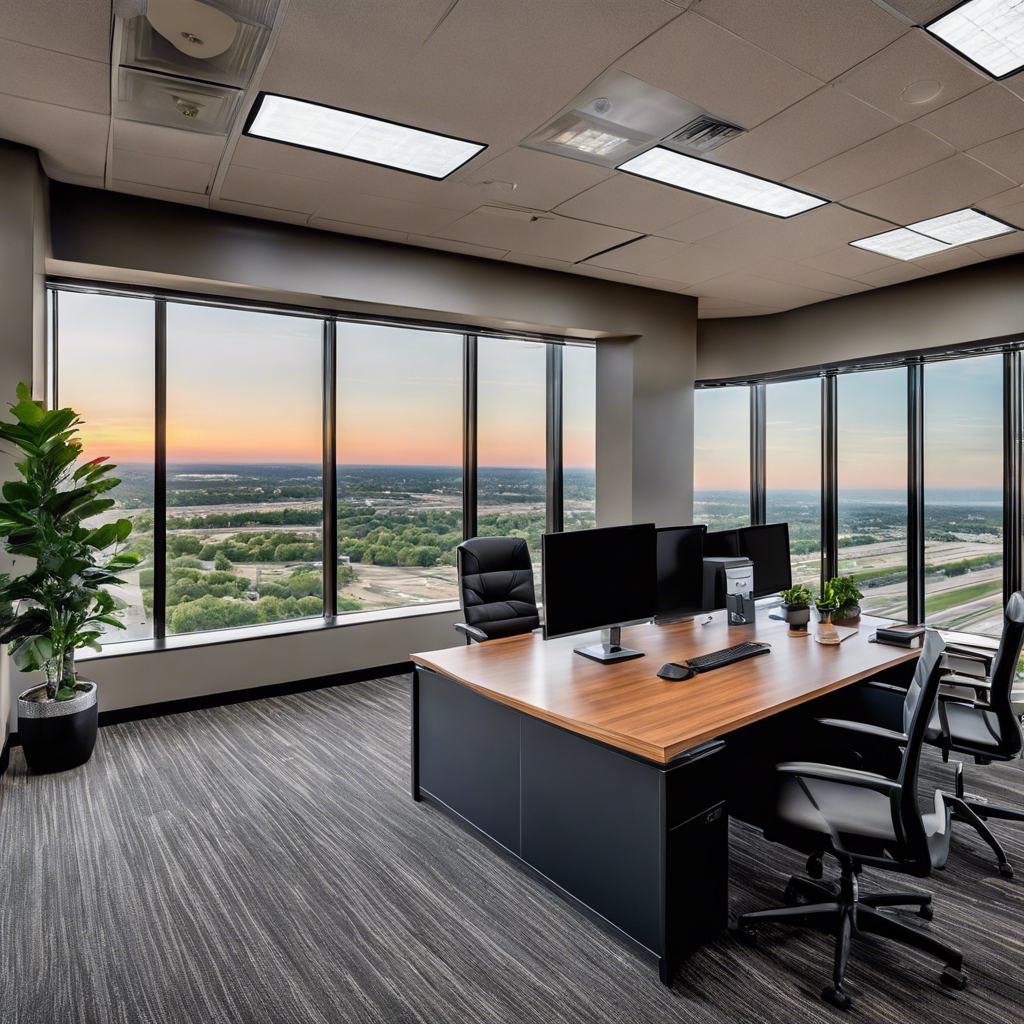Have you ever noticed how the temperature in your office can affect your productivity? It’s not just a coincidence. Research has shown that the link between HVAC systems and productivity in Tulsa offices is significant.
When the temperature is too hot or too cold, it can lead to discomfort and distraction, which in turn can hinder your ability to focus and perform tasks efficiently. But it’s not just about temperature. The humidity levels and air quality in your office also play a crucial role in employee performance.
So, how can you optimize your HVAC system to create the ideal work environment? Let’s explore the impact of temperature, humidity, air quality, and energy-efficient HVAC systems on workplace productivity, and discover strategies for maximizing your office’s HVAC performance.
Key Takeaways
- Temperature and humidity levels have a significant impact on productivity in Tulsa offices.
- Maintaining a comfortable and optimal temperature promotes employee engagement and reduces distractions.
- Poor air quality can lead to headaches and fatigue, while clean air enhances productivity and well-being.
- Implementing energy-efficient HVAC systems and optimizing their performance can further enhance workplace productivity and reduce costs.
The Impact of Temperature on Productivity
The temperature in an office space has a significant impact on productivity. Research shows that the impact of temperature on employee focus is undeniable. When the temperature is too hot or too cold, it can lead to distractions and a decrease in concentration levels. This can result in a decrease in productivity and overall performance.
On the other hand, when the temperature is comfortable, employees are more likely to be focused and engaged in their work. A comfortable workplace also has a positive effect on employee morale. When employees feel comfortable and taken care of in their environment, it creates a sense of belonging and satisfaction. This, in turn, boosts their morale and motivation to perform at their best.
Therefore, it’s crucial for employers to ensure that the temperature in the office is set at an optimal level to promote productivity and employee well-being.
The Role of Humidity in Employee Performance
High humidity levels can have a significant impact on your performance in the office. Research has shown that humidity control plays a crucial role in cognitive function. When humidity levels are too high, it can lead to feelings of discomfort and reduced concentration. This can negatively affect your ability to focus, make decisions, and solve problems.
On the other hand, low humidity levels can also have detrimental effects on your well-being. Dry air can cause irritation to your respiratory system, leading to symptoms such as coughing, sore throat, and dry skin.
Finding the right balance of humidity is essential for optimal employee performance and well-being. By implementing effective humidity control strategies, such as using humidifiers or dehumidifiers, you can create a comfortable and productive work environment.
The Connection Between Air Quality and Efficiency
To optimize your productivity and efficiency, it’s crucial to consider the impact of air quality on your work environment. The quality of the air you breathe directly affects your ability to focus and perform at your best.
Air pollution, both indoors and outdoors, can have detrimental effects on your ability to concentrate and stay focused on tasks. Poor air quality can cause symptoms such as headaches, fatigue, and respiratory problems, all of which can hinder your productivity.
That’s why proper ventilation is of utmost importance in maintaining a healthy work environment. Adequate ventilation helps to remove indoor air pollutants and circulate fresh air, creating a clean and comfortable space for you to work in.
Energy-Efficient HVAC Systems and Workplace Productivity
Energy-efficient HVAC systems play a vital role in enhancing workplace productivity. By adopting energy-saving HVAC technology, businesses can’t only reduce their carbon footprint but also create a conducive environment for employees to thrive. These systems optimize temperature and humidity levels, ensuring a comfortable workspace that promotes employee satisfaction and productivity.
Energy-saving HVAC technology utilizes advanced sensors and controls to regulate heating, ventilation, and air conditioning in a more efficient manner. These systems operate based on real-time data, adjusting settings to maintain optimal conditions while minimizing energy consumption. By doing so, businesses can significantly reduce energy costs while still providing a comfortable working environment.
Employee satisfaction is directly linked to workplace productivity. When employees are comfortable, they’re more likely to focus on their tasks and perform at their best. Energy-efficient HVAC systems contribute to creating a pleasant atmosphere, reducing distractions caused by temperature fluctuations or poor air quality.
Strategies for Optimizing HVAC Performance in Offices
A key aspect in maximizing HVAC performance in offices is implementing strategic optimization strategies. By employing effective strategies for maintenance and prioritizing the importance of ventilation, you can ensure that your HVAC system operates at its peak efficiency, providing a comfortable and productive environment for your employees.
Regular maintenance is essential to keep the system running smoothly and prevent any potential issues that may arise. This includes cleaning or replacing air filters, checking and adjusting thermostat settings, and inspecting ductwork for leaks or blockages.
Additionally, proper ventilation is crucial in maintaining indoor air quality and preventing the buildup of pollutants and contaminants. Ensuring adequate fresh air intake and proper air circulation won’t only enhance the HVAC system’s performance but also contribute to the overall well-being and productivity of your office space.
Frequently Asked Questions
What Are the Most Common Types of HVAC Systems Used in Office Buildings?
The most common types of HVAC systems used in office buildings are split systems, packaged systems, and variable refrigerant flow (VRF) systems. Each has its pros and cons, affecting comfort and productivity.
Can Poor Air Quality in the Office Lead to Health Issues for Employees?
Poor air quality in the office can lead to health issues for employees, which in turn can negatively impact employee productivity. Improving HVAC systems and ensuring good air circulation can provide health benefits and boost productivity.
How Can Employers Determine the Optimal Temperature Range for Their Office Environment?
To determine the optimal temperature range for your office environment, you need to consider its impact on employee productivity. By analyzing data and conducting surveys, you can identify the temperature range that fosters productivity and employee well-being.
Are There Any Government Regulations or Guidelines in Place Regarding HVAC Systems in the Workplace?
Government regulations and workplace guidelines play a crucial role in ensuring the proper functioning of HVAC systems in offices. Compliance with these regulations helps maintain a comfortable and productive work environment for employees.
What Steps Can Employers Take to Ensure the Proper Maintenance and Regular Servicing of Their HVAC Systems?
To ensure the proper maintenance and regular servicing of your HVAC system, you can take steps like outsourcing maintenance to professionals who specialize in HVAC systems. This ensures efficiency and keeps your system running smoothly.


